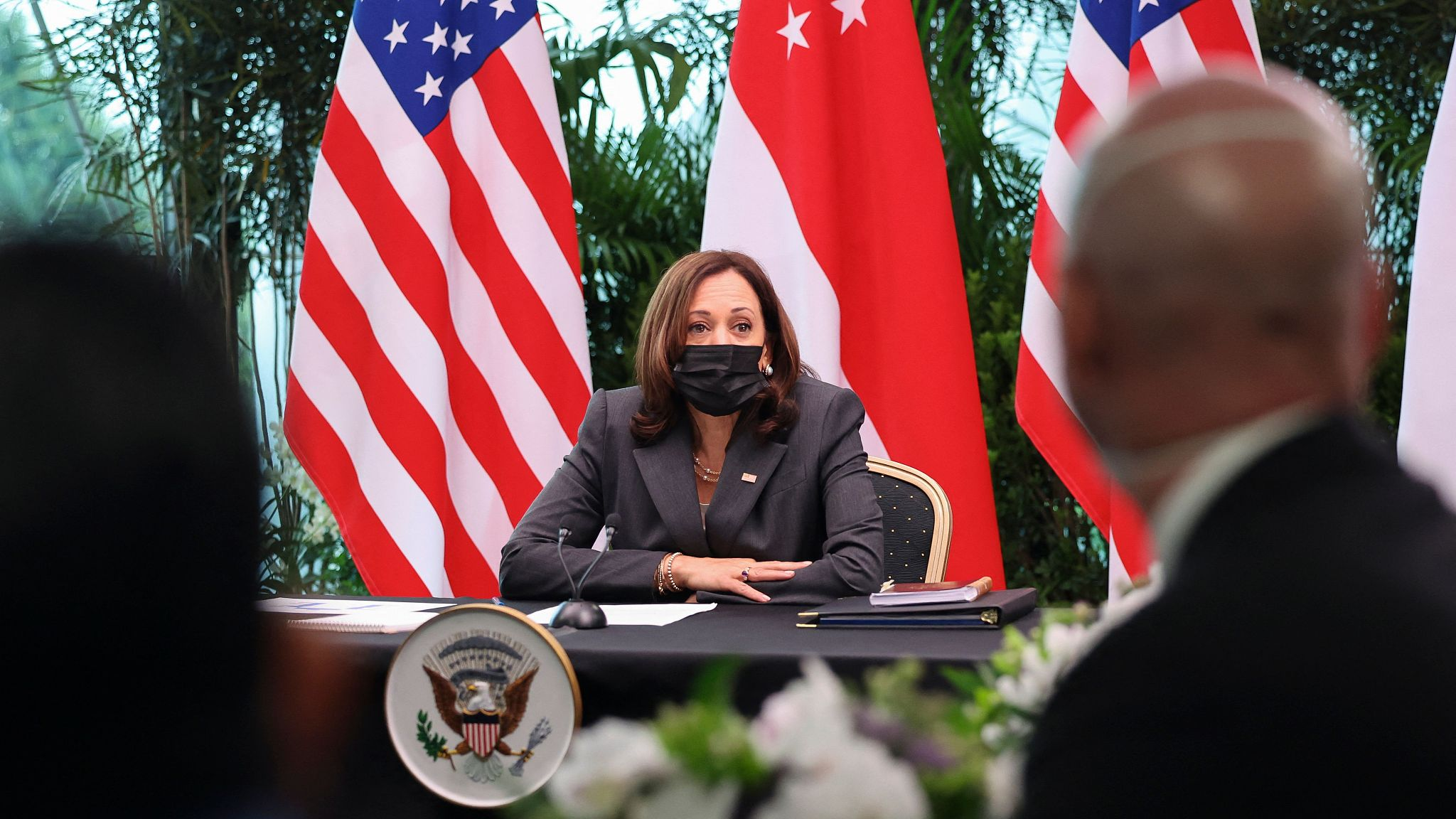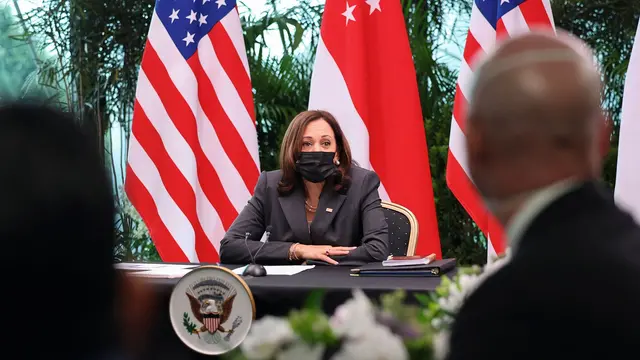
U.S. Vice President Kamala Harris attends a roundtable at Gardens by the Bay in Singapore, August 24, 2021.
Editor's note: Hamzah Rifaat Hussain is a former visiting fellow at the Stimson Center in Washington and serves as assistant researcher at the Islamabad Policy Research Institute (IPRI) in Pakistan. The article reflects the author's opinions and not necessarily the views of CGTN.
U.S. Vice President Kamala Harris's statements on the so-called "China practicing intimidation in Southeast Asia" further demonstrate that the U.S. has sacrificed constructivism for its hawkish neorealism once again in the region. By making such inflammatory statements in countries such as Singapore that have historically and in contemporary times hinged on a policy of neutrality and share close ties with Beijing, the decision to polarize at the expense of pursue apolitical multilateral proposals aimed at engineering economic growth is once again being highlighted.
With mounting domestic and international criticism over Washington's foreign policy pivots, there will always be little appetite for such adventurism.
The truth is that rebuking China will not obviate the controversial legacies of the United States, which have brought nothing but tensions in major regions across Asia and have been acknowledged domestically in the United States Congress. On the Afghanistan question, there was a major rupture hours before the divisive oratory with several prominent Republicans trashing the Joe Biden administration's Afghan policy as an utter embarrassment.
The bill was introduced by Republican Congressman Mike Waltz as a condemnation on the abject failure of presenting a coherent strategy aimed at tackling the long-term counterterrorism effects of the withdrawal from Kabul. This is despite the fact that the Republicans themselves have an equally controversial profile, with former President George W. Bush being the architect of the invasion in 2001.
Nevertheless, the presence of heightened domestic discord in the United States on the Afghanistan policy is evidence of the Biden administration being pressurized, with Waltz characterizing the Kabul policy as the worst foreign policy blunder in American history with the ruling party responsible for the ensuing humanitarian crisis.

A military transport plane takes off as Afghans who cannot get into the airport to evacuate watch and wonder while stranded outside, in Kabul, Afghanistan, August 23, 2021. /Getty
This fact is further complimented with growing international skepticism over partaking with the U.S., given that major capitals such as Berlin have raised alarm over the haphazard manner in which withdrawals took place as well as the entire Afghanistan policy. Chancellor Angela Merkel's successor, Armin Laschet of the Christian Democratic Union, like Congressman Waltz considers the withdrawal as the biggest debacle that NATO has suffered in history.
Ideally such criticism should have prompted the United States to shun further adventurism while disassociating itself with inflammatory rhetoric in the near future. This was not the case, however, as Vice President Harris relayed the fabricated China concern to Southeast Asian states by employing the same archaic language of Beijing posing a threat to "rules-based order" and sovereign territories. It was thus unsurprising that this was met with a harsh rebuke from Chinese Foreign Ministry spokesperson Wang Wenbin, who castigated U.S. foreign policy as hegemonic behavior bordering on bullying.
So far, none of that behavior is subsiding or being replaced with more visionary leadership, particularly in a region where polarizing policies have been shunned away for constructive engagement. The policy of non-alignment is embedded within the very tenets of Southeast Asian states, and while Kamala Harris sought to reassure countries such as Singapore that Washington, D.C. is not pressuring any state to take sides, the constant references to "Chinese expansionist" fallacies suggested otherwise.
If one of the countries were to trade pressure politics for protection of sovereign interests in Asia, as has been the case with Iran, it would be met with malicious campaigns bordering on defamation, attempts at international isolation and even economic coercion. Historical cases such as Cuba and in contemporary times with Iran buttress this fact, and attempting to bifurcate Southeast Asia into two camps will always be a futile exercise. Furthermore, to employ such strategies in the heat of domestic and international pressure with the eyes of millions of experts on the mass exodus of Afghans from their own country is in itself controversial and worthy of being castigated.
Yet Harris has chosen to take this path. However, this will not translate into gains for the United States in light of its controversial foreign policy, which has constantly shunned constructivism for neorealism and polarization.
(If you want to contribute and have specific expertise, please contact us at [email protected].)
 简体中文
简体中文

